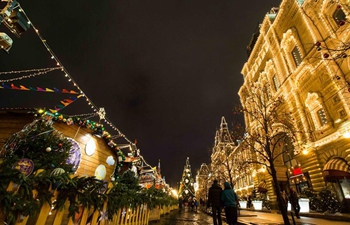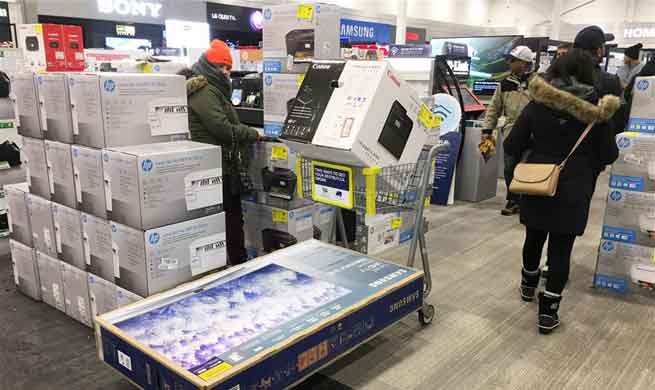by Xinhua writer Yu Shuaishuai
BRUSSELS, Dec. 27 (Xinhua) -- In recent years, Europe has been struggling to overcome its weak economic growth, surging anti-globalization and populism, and frequent terrorist attacks, among others.
Although Europe's economic recovery has begun to gather pace this year, consumers' enthusiasm for Christmas shopping seems to vary as the recovery rate differs in countries of the region.
COUNTRIES GAINING CONSUMPTION MOMENTUM
The traditional start of the festive sales period has already begun. Compared with last year, the French are regaining optimism about Christmas consumption, particularly their spending power.
The Centre for Retail Research based in Nottingham, Britain, predicted that the French will spend a total of 68.14 billion euros (80.88 billion U.S. dollars) during this year's festive season, an increase of 1.8 percent over the year 2016.
These days, there are more French customers than foreign tourists shopping in the Galeries Lafayette and Printemps department stores on Paris' Boulevard Haussman.
A shopping guide at the Galeries Lafayette told Xinhua that she was pleased to see a large number of French customers return to shopping malls. For the past several years, the shopping mall's sales were mainly driven by foreigners.
The French daily newspaper Les Echos even called this year's Christmas sales in French shopping malls "once in every ten years," saying that the massive return of the French customers indicates a regained confidence in the economy.
"When business does not rely merely on foreign tourists, the time when the economy turns better comes," said the report.
The Swedes enjoy similar high enthusiasm as the French, as numerous shoppers are seen carrying shopping bags and hunting for gifts and bargains in downtown Stockholm in the run-up to Christmas.
The Christmas spending this season was going to hit a new record, taking into account the population growth and the consumption-driven economy supported by Sweden's negative interest rate, said Swedish Retail Institute CEO Jonas Arnberg.
Data from the institute shows that Sweden's sales of goods in December is expected to reach 78.5 billion Swedish kronor (9.42 billion dollars), an increase of 3 percent on a year-on-year basis.
COUNTRIES MORE CAUTIOUS ABOUT CHRISTMAS SPENDING
Comparatively, British households are spending more cautiously on Christmas stuff due to a rising inflation and stagnant wages.
A British household will spend an average of 751 pounds (1,004 U.S. dollars) on gifts, foods, cards, trees and decorations this year, down from 780 pounds (1,043 dollars) in 2016, according to a recent report from YouGov, a market research and data analytics firm headquartered in Britain.
Overall, 29 percent of people interviewed by YouGov expected to spend less money than last year while 41 percent said they expected to spend the same. A further 27 percent expected to spend more, most likely due to rising prices.
At a shopping mall in London's Oxford Street, a consumer named Thomas told Xinhua that the items he wanted to buy this year are almost the same as last year, but they cost more because of rising prices.
Latest data from the British Office for National Statistics shows that the British inflation rate rose to 3.1 percent in November, a nearly six-year high.
The inflation rise, largely caused by the fall in pound value after the Brexit referendum in 2016, has begun to exert an impact on consumer confidence in Britain.
A Christmas survey of market research group Deloitte said that British retailers will be holding their breath for this year's festive shopping, following disappointing October sales figures, a rising inflation and the first interest rate rise in more than 10 years in the country.
The survey also pointed out that the Belgians are modest spenders, as Belgian households on average will spend 432 euros (513 dollars) on year-end festivities, which is 13 euros (15 dollars) lower than the European average.
For Greece, following nearly a 10-year-long economic recession, the country's economy has finally started to brighten up. The Greek people, however, remain cautious about Christmas spending since the shadow of the debt crisis still lingers.
"People are under pressure. Things are picked again and again, and the customers always require discounts," said Michailidis, a retailer at the Christmas Market in the Constitution Square metro station in Athens.
A customer called Polikseni told Xinhua that she has drastically reduced the number of gifts to purchase this year, and mostly she buys small gifts less than three euros (3.56 dollars).
Deloitte also said in its survey that Greek families' Christmas budget this year will be 450 euros (534 dollars) on average, slightly lower than the 457 euros (542 dollars) in 2016. Enditem
(Xinhua reporters Wen Xiqiang, Xu Tian, Fu Yiming and Chen Zhanjie also contributed to the story.)

















